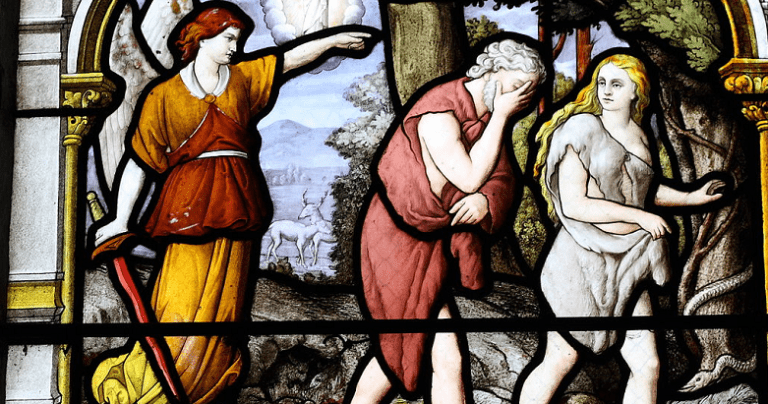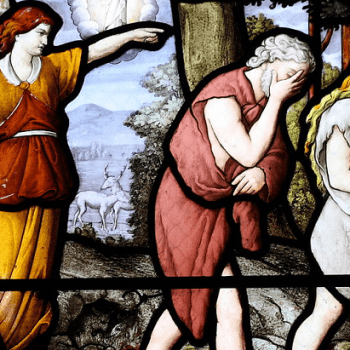
By Vardell Taylor
Do we really understand the seriousness of the fall?
When I was teaching Sunday School, I got the impression that most Latter-day Saints think that we come into this world perfect, and sure, everyone will sin, but those with the willpower to stop sinning will earn the kingdom of God. And yes, “earn” is the exact word that was used.
There seems to be little acknowledgement of what the scriptures teach about the seriousness of the fall. I suspect some of our misunderstanding comes from the article of faith, “we are punished for our own sins, not for Adam’s transgression.” So how can we be on a trajectory to hell because of the fall of Adam? I certainly can’t explain the “why” of the fall, but the scriptures do teach us of its effects.
Many scriptures tell us that because of Adam’s fall, we are already in fact “lost”, and are even “carnal, sensual and devilish.” (Mosiah16:3,4; 2 Nephi 2:21,26; Alma 41:11). King Benjamin taught his very obedient people that, “the knowledge of the goodness of God at this time has awakened you to a sense of your nothingness, and your worthless and fallen state” (Mosiah 4:5). We are “unworthy, and because of the fall our natures have become evil continually” (Ether 3:2). All mankind are “fallen, and in the grasp of justice; yea, the justice of God, which consigned them forever to be cut off from his presence” (Alma 42:14). We are under the “curse of Adam” (Moroni 8:8). We have died the “first death”. We are already spiritually dead! (Alma 11:45; 42:9; D&C 29:41) We have failed the “first judgement” (2 Nephi 9:7). Suffered the wrath of his “first provocation” (Alma 12:36).
From the scriptures then, we learn that without divine intervention everyone is destined for a hellish outcome. So, just how do we regain his presence? Most people conclude that improved behavior will regain our worthiness. That is their understanding of repentance. But that paradigm of repentance is not taught in the scriptures. In God’s justice system, improved behavior will not expunge past bad behavior. We’d like to say, “Yes judge, I did break the law, I was doing 40 in a 20, but I will never do it again, so can’t we just forget it ever happened?”
No amount of self-improvement can change our dire situation. “Since man had fallen, he could not merit anything of himself.” (Alma 22:13). Aren’t we inclined to think Aaron has exaggerated here? Don’t we really think that good people “merit” salvation? The scriptures clearly tell us that even if we could keep 99% of the commandments, that will not be good enough to “merit” our exaltation. “Cursed is every one that continueth not in all things which are written in the book of the law to do them” (Galatians 3:10). Aaron did not exaggerate – man can merit nothing of himself.
Lehi stated our problem like this, “All men know good from evil, and the law is given unto men, and by the law no flesh is justified. By the law men are cut off, by the temporal law they were cut off, and by the spiritual law they perish from that which is good, and become miserable forever” (2 Nephi 2:5). Paul taught the same principle: “By the deeds of the law, there shall no flesh be justified in his sight:” (Romans 3:20). “A man is not justified by the works of the law, … by the works of the law shall no flesh be justified (Galatians 2:16). Do you get the message? No flesh – not a single human soul – can comply with God’s law. No matter what good things we do, and regardless of how many commandments we keep, no one can make himself worthy of salvation.
But obviously God provided a way – the Atonement of Christ. I doubt mortals can fully comprehend the magnitude of Christ’s atonement, but the scriptures teach extensively that it enables our forgiveness and our redemption.
Paul taught extensively that Christ satisfies the law for us, and that we are justified with the law through our faith in Christ. Now some Latter-day Saints ignore what Paul says about the law, contending that Paul was referring to the law of Moses. But Paul’s teachings apply to all of Gods laws. How can I say that? Because without law there is no sin. It is by the law that we define sin (Romans 4:15; 5:13; 7:7-14; 2 Nephi 2:13; Alma 42:17). “How could a man repent except he should sin? How could he sin if there was no law?” The most repeated message in the scriptures is for men to repent, and men need to repent because they sin, and sin brings us under the condemnation and curse of a broken law (See Moroni 8:24; Galatians 3:10; Romans 3:19; 2Nephi 2:5; Alma 42:18).
It’s true we are no longer obligated to sacrifice animals, but we are still obligated to keep part of the Mosaic law: the Ten Commandments. Our current law is the law of the Gospel, a law that demands even more from us. And in teaching the Ephesians that they are saved by faith in Christ, Paul makes no reference to the law, but uses the word “works”: “For by grace are ye saved through faith; and that not of yourself: it is the gift of God: Not of works, lest any man should boast” (Ephesians 2:8–9).
So the law that Paul refers to is the same law that Lehi, Nephi, and Alma refer to, and breaking one commandment cuts us off. “By the law we perish from that which is good and become miserable forever” (2 Nephi 2:5). Lehi states this same ominous message again in verse 26,“And the Messiah cometh in the fulness of time, that he may redeem the children of men from the fall. And because that they are redeemed from the fall they have become free forever, knowing good from evil; to act for themselves and not to be acted upon, save it be by the punishment of the law at the great and last day…” (2 Nephi 2:26). Lehi is saying that those who do not gain redemption through Christ, will be punished according to the law–according to justice.
So, the scriptures say that we begin life fallen, lost, even spiritually dead, and that we cannot “earn” our way back to God. Doesn’t that sound disheartening? Is it any wonder that we become discouraged, depressed, and hopeless? If that doesn’t sound like a plan of happiness, you’re right, it’s not–at least not yet. It’s the plan to break our hearts and bend our knees. And our redemption cannot happen until both of those things happen. Yes, exquisite joy will come, but only after experiencing exquisite heartbreak. That is our next subject, understanding the broken heart.














